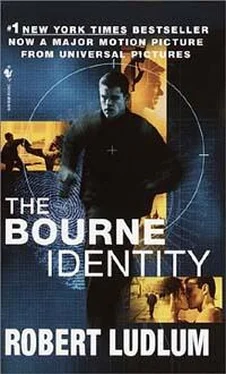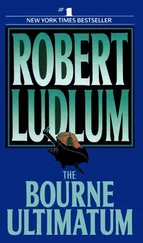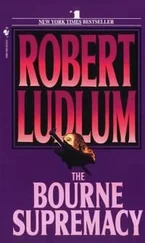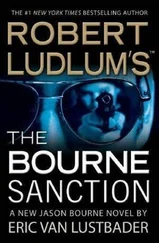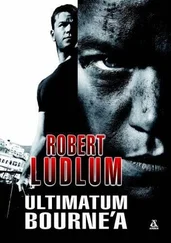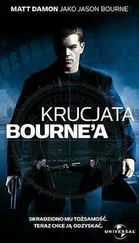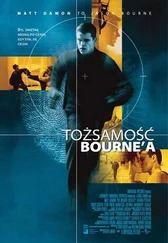Robert Ludlum - The Bourne Identity
Здесь есть возможность читать онлайн «Robert Ludlum - The Bourne Identity» весь текст электронной книги совершенно бесплатно (целиком полную версию без сокращений). В некоторых случаях можно слушать аудио, скачать через торрент в формате fb2 и присутствует краткое содержание. Год выпуска: 1980, ISBN: 1980, Жанр: Триллер, на английском языке. Описание произведения, (предисловие) а так же отзывы посетителей доступны на портале библиотеки ЛибКат.
- Название:The Bourne Identity
- Автор:
- Жанр:
- Год:1980
- ISBN:ISBN: 0553260111
- Рейтинг книги:5 / 5. Голосов: 1
-
Избранное:Добавить в избранное
- Отзывы:
-
Ваша оценка:
- 100
- 1
- 2
- 3
- 4
- 5
The Bourne Identity: краткое содержание, описание и аннотация
Предлагаем к чтению аннотацию, описание, краткое содержание или предисловие (зависит от того, что написал сам автор книги «The Bourne Identity»). Если вы не нашли необходимую информацию о книге — напишите в комментариях, мы постараемся отыскать её.
He has no past. And he may have no future. His memory is blank. He only knows that he was flushed out of the Mediterranean Sea, his body riddled with bullets.
There are a few clues. A frame of microfilm surgically implanted beneath the flesh of his hip. Evidence that plastic surgery has altered his face. Strange things that he says in his delirium—maybe code words. Initial: "J.B." And a number on the film negative that leads to a Swiss bank account, a fortune of four million…
The Bourne Identity — читать онлайн бесплатно полную книгу (весь текст) целиком
Ниже представлен текст книги, разбитый по страницам. Система сохранения места последней прочитанной страницы, позволяет с удобством читать онлайн бесплатно книгу «The Bourne Identity», без необходимости каждый раз заново искать на чём Вы остановились. Поставьте закладку, и сможете в любой момент перейти на страницу, на которой закончили чтение.
Интервал:
Закладка:
At three minutes past two, the lights in the motel corridor flickered and went out, leaving the long hallway in relative darkness, the spill from the stairwell the only source of illumination. Bourne stood by the door of their room, pistol in hand, the lights turned off, watching the corridor through a crack between the door’s edge and the frame. Marie was behind him, peering over his shoulder; neither spoke.
The footsteps were muffled, but there. Distinct, deliberate, two sets of shoes cautiously climbing the staircase. In seconds, the figures of two men could be seen emerging our of the dim light. Marie gasped involuntarily; Jason reached. over his shoulder, his hand gripping her mouth harshly. He understood; she had recognized one of the two men, a man she had seen only once before. In Zurich’s Steppdeckstrasse, minutes before another had ordered her execution. It was the blond man they had sent up to Bourne’s room, the expendable scout brought now to Paris to spot the target he had missed. In his left hand was a small pencil light, in his right a long-barreled gun, swollen by a silencer.
His companion was shorter, more compact, his walk not unlike an animal’s tread, shoulders and waist moving fluidly with his legs. The lapels of his topcoat were pulled up, his head covered by a narrow-brimmed hat, shading his unseen face. Bourne stared at this man; there was something familiar about him, about the figure, the walk, the way he carried his head. What was it? What was it?
He knew him.
But there was not time to think about it; the two men were approaching the door of the room reserved in the name of Mr. and Mrs. Briggs. The blond man held his pencil light on the numbers, then swept the beam down toward the knob and the lock.
What followed was mesmerizing in its efficiency. The stocky man held a ring of keys in his right hand, placing it under the beam of light, his fingers selecting a specific key. In his left hand he gripped a weapon, its shape in the spill revealing an outsized silencer for a heavy-calibered automatic, not unlike the powerful Sternlicht Luger favored by the Gestapo in World War Two. It could cut through webbed steel and concrete, its sound no more than a rheumatic cough, ideal for taking enemies of the state at night in quiet neighborhoods, nearby residents unaware of any disturbance, only of disappearance in the morning.
The shorter man inserted the key, turned it silently, then lowered the barrel of the gun to the lock. Three rapid coughs accompanied three flashes of light; the wood surrounding any bolts shattered. The door fell free; the two killers rushed inside.
There were two beats of silence, then an eruption of muffled gunfire, spits and white flashes from the darkness. The door was slammed shut; it would not stay closed, falling back as louder sounds of thrashing and collision came from within the room. Finally a light was found; it was snapped on briefly, then shot out in fury, a lamp sent crashing to the floor, glass shattering. A cry of frenzy exploded from the throat of an infuriated man.
The two killers rushed out, weapons leveled, prepared for a trap, bewildered that there was none.
They reached the staircase and raced down as a door to the right of the invaded room opened. A blinking guest peered out, then shrugged and went back inside. Silence returned to the darkened hallway.
Bourne held his place, his arm around Marie St. Jacques. She was trembling, her head pressed into his chest, sobbing quietly, hysterically, in disbelief. He let the minutes pass, until the trembling subsided and deep breaths replaced the sobs. He could not wait any longer; she had to see for herself. See completely, the impression indelible; she had to finally understand. I am Cain. I am death.
“Come on,” he whispered.
He led her out into the hallway, guiding her firmly toward the room that was now his ultimate proof. He pushed the broken door open and they walked inside.
She stood motionless, both repelled and hypnotized by the sight. In an open doorway on the right was the dim silhouette of a figure, the light behind it so muted only the outline could be seen, and only then when the eyes adjusted to the strange admixture of darkness and glow. It was the figure of a woman in a long gown, the fabric moving gently in the breeze of an open window.
Window. Straight ahead was a second figure, barely visible but there, its shape an obscure blot indistinctly outlined by the wash of light from the distant highway. Again, it seemed to move, brief, spastic flutterings of cloth—of arms.
“Oh, God,” said Marie, frozen. “Turn on the lights, Jason.”
“None of them work,” he replied. “Only two table lamps; they found one.” He walked across the room cautiously and reached the lamp he was looking for; it was on the floor against the wall. He knelt down and turned it on; Marie shuddered.
Strung across the bathroom door, held in place by threads torn from a curtain, was her long dress, rippling from an unseen source of wind. It was riddled with bullet holes.
Against the far window, Bourne’s shirt and trousers had been tacked to the frame, the panes by both sleeves smashed, the breeze rushing in, causing the fabric to move up and down. The white cloth of the shirt was punctured in a half-dozen places, a diagonal line of bullets across the chest.
“There’s your message,” said Jason. “Now you know what it is. And now I think you’d better listen to what I have to say.”
Marie did not answer him. Instead, she walked slowly to the dress, studying it as if not believing what she saw. Without warning, she suddenly spun around, her eyes guttering, the tears arrested.
“No! It’s wrong! Something’s terribly wrong! Call the embassy.”
“What?”
“Do as I say. Now!”
“Stop it, Marie. You’ve got to understand.”
“No, goddamn you! You’ve got to understand! It wouldn’t happen this way. It couldn’t.”
“It did.”
“Call the embassy! Use that phone over there and call it now! Ask for Corbelier. Quickly, for God’s sake! If I mean anything to you, do as I ask!”
Bourne could not deny her. Her intensity was killing both herself and him. “What do I tell him?” he asked, going to the telephone.
“Get him first! That’s what I’m afraid of … oh, God. I’m frightened!”
“What’s the number?”
She gave it to him; he dialed, holding on interminably for the switchboard to answer. When it finally did, the operator was in panic, her words rising and falling, at moments incomprehensible. In the background he could hear shouts, sharp commands voiced rapidly in English and in French.
Within seconds he learned why.
Dennis Corbelier, Canadian attaché, had walked down the steps of the embassy on the avenue Montaigne at 1:40 in the morning and had been shot in the throat. He was dead.
“There’s the other part of the message, Jason,” whispered Marie, drained, staring at him. “And now I’ll listen to anything you have to say. Because there is someone out there trying to reach you, trying to help you. A message was sent, but not to us, not to me. Only to you, and only you were to understand it.”
22
One by one the four men arrived at the crowded Hilton Hotel on Sixteenth Street in Washington, D.C. Each went to a separate elevator, taking it two or three floors above or below his destination, walking the remaining flights to the correct level. There was no time to meet outside the limits of the District of Columbia; the crisis was unparalleled. These were the men of Treadstone Seventy-One—those that remained alive. The rest were dead, slaughtered in a massacre on a quiet, tree-lined street in New York.
Two of the faces were familiar to the public, one more than the other. The first belonged to the aging senator from Colorado, the second was Brigadier General I. A. Crawford—Irwin Arthur, freely translated as Iron Ass—acknowledged spokesman for Army Intelligence and defender of the G-2 data banks. The other two men were virtually unknown except within the corridors of their own operations. One was a middle-aged naval officer, attached to information Control, 5th Naval District. The fourth and last man was a forty-six-year-old veteran of the Central Intelligence Agency, a slender, coiled spring of anger who walked with a cane. His foot had been blown off by a grenade in Southeast Asia; he had been a deep-cover agent with the Medusa operation at the time. His name was Alexander Conklin.
Читать дальшеИнтервал:
Закладка:
Похожие книги на «The Bourne Identity»
Представляем Вашему вниманию похожие книги на «The Bourne Identity» списком для выбора. Мы отобрали схожую по названию и смыслу литературу в надежде предоставить читателям больше вариантов отыскать новые, интересные, ещё непрочитанные произведения.
Обсуждение, отзывы о книге «The Bourne Identity» и просто собственные мнения читателей. Оставьте ваши комментарии, напишите, что Вы думаете о произведении, его смысле или главных героях. Укажите что конкретно понравилось, а что нет, и почему Вы так считаете.
